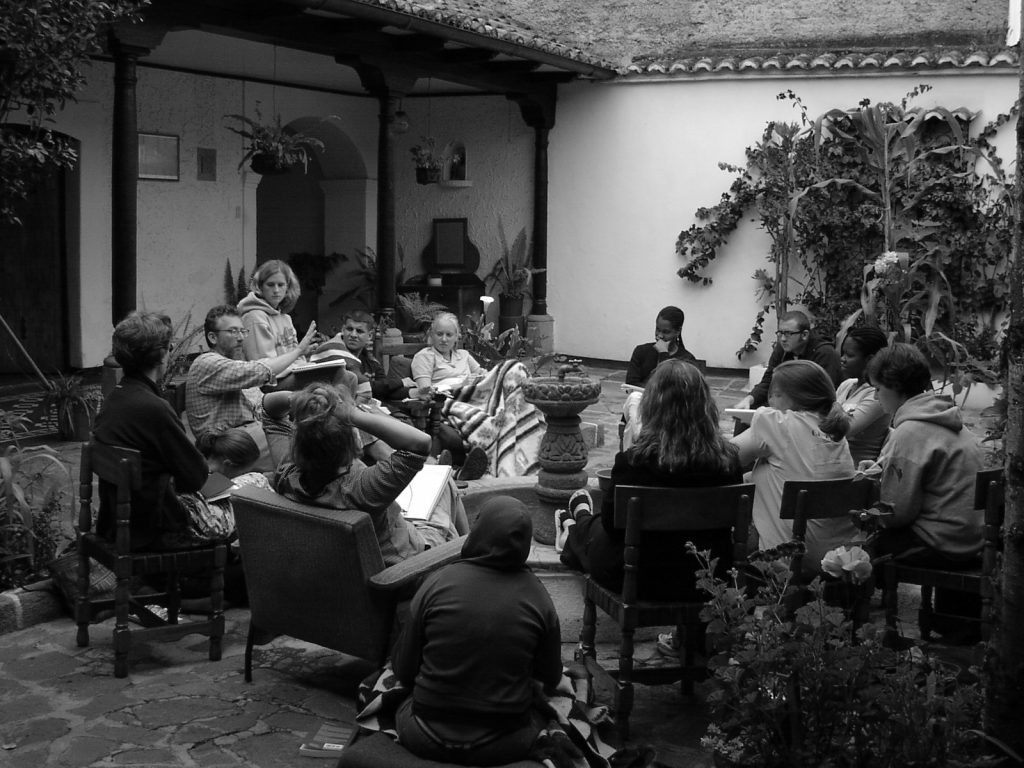SUBJECTS
The diverse variety of philosophical subjects that I bring to the classroom greatly enhances the students’ ability to articulate their life-experiences in more cosmopolitan ways. I teach so-called traditional philosophical authorities, such as Descartes, Hobbes, Locke, Leibniz, Hume, Kant, Hegel, Marx, Ortega y Gasset, and Sartre in my core courses; but I teach also feminist theorists such as de Beauvoir, Benhabib, Bordo, and Lugones, and I try to motivate my students to explore the undercurrents of gender, race, and class that flow underneath apparently fixed philosophical concepts. Also, in pertinent core courses and philosophy electives, I introduce my students to the thoughts and worldviews of other cultures, whether they be the African traditionalism of the Ugandan writer Okot p’Bitek (about whose thought I became acquainted in my 1991 visit to Kenya), the philosophy of liberation of Enrique Dussel, the liberation theology of Gustavo Gutiérrez, Juan Luis Segundo, and Cornel West, social narratives of struggle and human rights theories of the Guatemalan Mayan Rigoberta Menchú and the African-American Malcolm X, the conceptual constructs of time and space in the (possibly) 1550s Quiche-Mayan book The Popol Vuh, the self-assured concoction of Plato’s psychology, Hegel’s phenomenology and Nietzsche’s übermenschen politics elaborated by Francis Fukuyama, or the critical postmodernism of Hardt and Negri. I believe that through my scholarship I have contributed in very positive and profound ways to the cultural and intellectual pluralism of the academic life of Le Moyne College.
THE WORLD OF THE OTHER
As Director of the Integral Honors Program, I created and designed Honors 402 (The World of the Other), the first honors course taught abroad. One of the principal objectives of the course was to teach an interdisciplinary course on contemporary issues (e.g., globalization) in the context of the social relations characteristics of a poor region of the world.
The objectives of the course were the following:
- To acquaint the student with the lives and experiences of people in another culture.
- To help the student appreciate the artistic and literary achievements of Indigenous and Latin American artists.
- To sensitize the student to the effects of globalization in a poor country.
- To help the student reflect on the consequences of an unequal distribution of wealth.
The course was guided by a desire to understand globalization and its effects on the poor of poor countries. Over 1.2 billion people live today in abject poverty, and the gap between the rich and the poor has been growing: as some countries of the so-called third world have become wealthy, a large number of their populations have become poorer. A more direct experience of some negative effects of globalization helped us appreciate better both the negative and the positive aspects of the new global conditions that have been emerging during the past three decades. The course was also designed with the purpose of showing that our relations with our “Other” need not be fraught with fear, anger, bravado, or acquisitiveness. When understanding others appreciatively is an end in itself, our relations with the world’s poor are no longer reducible to geopolitical confrontation and business connections.
In many respects, Guatemala is not like most of Latin America. The gap between rich and poor is greater than average, the cultural, economic, and political separation between “ladino” and indigenous is deeper than in most of Latin America; the economy is not nearly as developed as it is in many other places in Latin America. So, in those respects we did not travel to a “typical” Latin American country.
In terms of cultural production, elán vital, and the aesthetic sense of life, we learned quite a bit that was worthwhile for our spiritual development. The sense of religiousness (that is, the feeling for the transcendent), and the philosophical attitude of wonder regarding the totality of the horizon and the forever-latent to that totality, are both highly developed in Guatemalan culture. The attunement to absolute alterity to which I refer, whether religious or philosophical, brings together and at times keeps separate Mayan, Catholic, and syncretistic religions and philosophies. As we opened ourselves to novelty, Guatemalan “metaphysics” proved to be quite challenging . . . and transformative.
Many students in this course found it to be a life-changing experience.
Contact
Phone
+1 (315) 445-4100
Address
Philosophy Department
Le Moyne College
1419 Salt Springs Rd.
Syracuse, New York 13214
Contáctame
Correo Electrónico
saenz@lemoyne.eduTeléfono
+1 (315) 445-4100
Dirección
Philosophy Department
Le Moyne College
1419 Salt Springs Rd.
Syracuse, New York 13214
